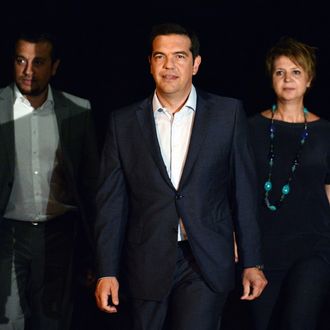
Greek Prime Minister Alexis Tsipras resigned today — but not because he’s tired of dealing with his country’s stress-inducing economic state. He’s hoping that voters will reelect him — and give him a mandate that makes it easier to deal with the people in his party who aren’t too happy with his decision to back the latest bailout.
It’s been less than a year since Tsipras was elected prime minister of Greece, promising that he and his party — the leftist Syriza — were going to banish the European Union’s harsh austerity measures for good.
In the months since he took office, he’s instead had to switch course, embracing a new bailout deal that keeps austerity a part of the Greek economy’s rehabilitation plan — raising taxes and the retirement age while making steep spending cuts. The most left-wing factions in Syriza balked at Tsipras’ decision to accept the new eurozone deal — especially since Tsipras had previously asked Greek voters to vote against the proposal in a referendum. The anti-bailout wing of the party said that Greece should exit the eurozone and return to the drachma instead of continue to pay back crushing debts with little aid to help Greece’s bruised economy. Nearly a third of Tsipras’ party refused to support the deal last week; it passed with the help of three opposition parties.
Given that a considerable part of his party disagrees with his more moderate ways nowadays, Tsipras seems to have decided he’d like to see if the voters will give him a chance to build a government that makes it easier for the deal to go on undeterred — and gives him a mandate that makes his stance on the deal an easier sell.
The Prime Minister resigned in a televised address, and called for new elections that would take place in late September — soon enough that it will be hard for Tsipras’ rivals to mount much opposition, although the anti-bailout part of Syriza has discussed breaking away from the party and forming a new one. Despite the fact that Tsipras was unable to eradicate austerity, his popularity is still considerably high; he has said that he got the best deal possible if Greece wanted to stay in the eurozone — and a majority of voters do.
“I want to be honest with you,” he said today. “We did not achieve the agreement we expected before the January elections.”
He added, “Now it will be to the people to decide. I feel the deep moral, political obligation to submit to your judgment. Your vote will determine if we represented you courageously in talks with the creditors, if this agreement is enough for us to emerge from the crisis.”
Many people thought that Tsipras would call elections later this year, but that would have been after the new spending cuts had gone into place — something that will surely not help his popularity much. The opposition parties in the Greek parliament will be given a chance to form a minority government before the elections are called; since Syriza holds 149 of the 300 seats in the legislative body, that would be an extremely difficult thing to do.
Shortly before Tsipras’ announcement, European leaders agreed to send Greece its first rush of money to help pay off debt — $14.5 billion. Greece has to make a payment to the European Central Bank today. Some observers wondered if the political instability prompted by Tsipras’ resignation — and the interim government that will take his place — would endanger Greece’s ability to fulfill its side of the deal. Others said a month of instability might be necessary to stave off years of additional economic turmoil. Either way, today’s news seems confirmation that Greeks are unlikely to feel too comfortable about their political or economic future anytime soon — six general elections in eight years is a lot.





























